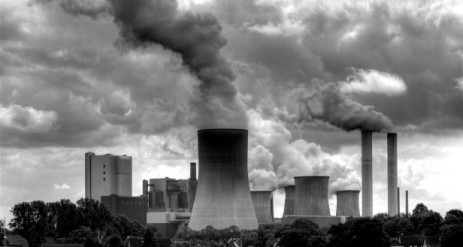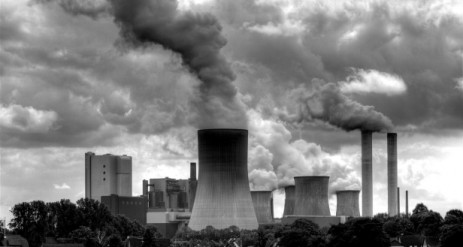 You’ll be fed a heavy dose of “clean” coal if Republicans win the House this fall.Photo courtesy davipt via Flickr Time to face reality: It’s looking more and more likely that the Republicans will win back the House this November. So what does that mean? Well, it could mean Sorry Joe Barton (R-Texas) running the Energy and Commerce Committee. And a whole lot of talk about nuclear energy and “clean” coal.
You’ll be fed a heavy dose of “clean” coal if Republicans win the House this fall.Photo courtesy davipt via Flickr Time to face reality: It’s looking more and more likely that the Republicans will win back the House this November. So what does that mean? Well, it could mean Sorry Joe Barton (R-Texas) running the Energy and Commerce Committee. And a whole lot of talk about nuclear energy and “clean” coal.
Oy.
Show us the money: We got a glimpse of this dim future yesterday when key House Republicans met with about 50 energy and telecom lobbyists yesterday on Capitol Hill. And their message, an industry source told Politico’s Darren Samuelsohn, was this:
You should be giving us money because we’re going to be in charge. We’ll ensure there is no climate bill. But at the same time, they think they’ll build nuclear plants and more clean coal.
It’s considerably less likely the GOP will be ruling the Senate next year, but Samuelsohn also asked Senate Minority Leader Mitch McConnell (R-Ky.) what his energy priorities would be if it did: “Nuclear power, clean coal technology, offshore drilling, plug-in hybrid cars and trucks.” When asked specifically about climate change, McConnell replied, “Clean coal technology and nuclear power would address the climate problem.”
Double oy.
Send in the clowns: So would Joe (“Did I mention I was sorry?”) Barton really be the big dog on the House Energy and Commerce Committee if Republicans win a majority? He is sitting in the top spot at the moment, but since his term as senior Republican on the committee expires this year, he’d have to get a waiver from his party to stay in charge. Others in the mix are Rep. Fred Upton (R-Mich.), a senior member of the committee — but he’s probably too moderate for a party that will want to make a statement about climate change — and Rep. Cliff Stearns (R-Fla.). Stearns has voted against every piece of environmental legislation that’s come through the House during the past 10 years, but even he may be too temperate. Beyond them, who? Well, there’s speculation that Rep. John (“I never met a lobbyist I didn’t like”) Boehner (R-Ohio) will choose Rep. John Shimkus (R-Ill.), a man so addled about climate change that, as Kate Sheppard reminds us in Mother Jones, he once said cutting carbon dioxide emissions would mean “taking away plant food from the atmosphere.”
Bradford Plumer, writing in The New Republic, had this to add about what may be in store for us:
But Republicans in the next Congress will likely try hard to a) strip the EPA of its authority or b) deny the agency the funds it needs to enforce these regulations. Obama has already said he’d veto any such efforts, but they’re likely to resurface as riders to all sorts of appropriations bills. That means Obama will have to fight this duel again and again and again. Does the White House actually have the stomach for that? Green groups are suiting up to defend the Clean Air Act, but the next two years are going to be grueling.
And God said, “Let there be soot.”: On cue a group of several hundred coal miners herded together in a park on Capitol Hill yesterday to let the world know that the EPA was out to get them. By regulating greenhouse gas emissions in coal-fired plants and cracking down on the odious practice of mountaintop mining, the feds, they said, would do them wrong. Oh, one other teeny detail: the cost of bussing the miners in from West Virginia, Virginia, Pennsylvania, and Ohio and putting them up in motels was covered by Faces of Coal, an outfit backed by the coal industry. But political theater is only as good as its stars and they were out in force — from Senate Minority Leader McConnell to coal state congressmen such as Sen. Jim Webb (D-Va.) and Rep. Hal Rogers (R-Ky.), who charged up the miners by telling them the Obama administration was trying to “fire all of you.” Also chiming in was Sen. Jay Rockefeller (D-W.Va.), who takes very seriously his role of making sure Ol’ King Coal remains a merry old soul. He had this to say about EPA Director Lisa Jackson:
She doesn’t understand the sensitivities economically of what unemployment means. Her job is relatively simple: clean everything up, keep it clean, don’t do anything to disturb perfection. Well, you can’t do coal and do that at the same time. God didn’t make coal to be an easy thing to work with.
Let the claims begin: The skirmishing is underway, leading up to the upcoming battle over the EPA’s plans to start cracking down on greenhouse gas pollution in January. Today the Clean Energy Works coalition starts running a 30-second TV ad titled “No Delay.” The spot warns viewers that “special interests” are on a mission to stifle the EPA and declares that “Washington politicians need to get off the dime and not let corporate polluters off the hook.” From the other side comes a letter to the Senate leadership from Michael Morris, CEO of the American Electric Power Company. On behalf of the Business Roundtable, an association of corporate CEOs, Morris complained that regulating carbon dioxide emissions was a job for Congress, not the EPA. (He must have been away this summer.) Morris wrote:
A vote to delay pending EPA greenhouse gas emissions will provide Congress the opportunity to develop sound policy approaches to address greenhouse gas emissions, rather than default to a poorly designed EPA regulatory approach that is likely to further damage U.S. competitiveness, drive up consumer costs and make an immaterial contribution to reducing global greenhouse gas concentrations.
Ready or not: There is some good news for the EPA. When its climate rules for greenhouse gas emissions kick in on Jan. 2, 2011, about 80 percent of the states say they’ll be ready to issue the required permits to large industrial plants. That’s according to a survey by the National Association of Clean Air Agencies. The EPA will step in for those states that aren’t ready, but some, such as Arizona and Texas, say they’re not planning to go along with the feds’ agenda. Texas Attorney General Greg Abbott is already on record as saying that his state “has neither the authority nor the intention of interpreting, ignoring, or amending its laws in order to compel the permitting of greenhouse gas emissions.”
You’re getting warmer: In case you hadn’t heard, the Earth is getting warmer. NOAA reported yesterday that global land and ocean surface temperatures from this January through August tied 1998 for the highest since record-
keeping started in 1880. Also, so much sea ice melted this summer that the Arctic ice sheet covered the third smallest area on record. Scientists now think that by 2030 the region could be ice free into the month of September.
Catching rays: While enviro groups are trying to keep hope alive for a vote in Congress on a Renewable Electricity Standard after the fall elections, greens in California can take some consolation in the upcoming construction boom of solar panels in the Mojave Desert. Last night, the California Energy Commission approved a plan for the largest thermal solar plant in the world, one that eventually will be able to power 800,000 homes. It’s one of nine solar plants in the state rushing to be under construction by the end of the year so that they’ll still qualify for federal grants from President Obama’s stimulus package. And there’s the rub — that tap of federal money shuts off December 31.
Blow, baby, blow: And on the wind energy front, a new study by the National Renewable Energy Laboratory concludes that the potential of offshore wind power in the U.S. is at least four times as great as the country’s total electricity generating capacity from all sources in 2008.
Getting untrashed: Finally, a college football game is not an experience associated with responsible behavior. But never let it be said that the EPA shies away from big challenges. So the agency has set up a competition to see which campus can do the best job of cleaning up its act after a home game in October. Schools will be judged on such things as the least amount of waste generated per attendee, the greatest greenhouse gas reductions, and the highest recycling and composting rates.
Reminder: Spilling beer is not recycling.



